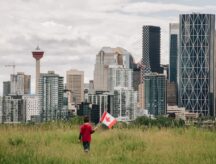Canada must respond quickly to help Afghan refugees
We have all watched in dismay the images coming from Afghanistan.
Desperate people are looking for a way out as they fear for their lives under the Taliban. If the past is a prologue, Taliban rule will result in millions of Afghans looking to flee. According to the UN, there were nearly 5 million Afghan refugees and internally displaced persons prior to the arrival of the NATO-led coalition in 2001.
Afghanistan’s population has doubled since 2001, so another major humanitarian crisis appears imminent and it is incumbent on Canada to act. Since the end of the Second World War, Canada has played a leading role in helping those in need. In this case, we have an added moral obligation to provide safety to the very same Afghans who assisted Canadian troops, diplomats, Canadian NGOs and our allies. Afghans that assisted foreigners are now walking targets for the Taliban and we as Canadians cannot leave them hanging out to dry.
Let’s remember there is a unique opportunity for Canadians to identify solutions amid the federal election campaign. Every party which aspires to lead our country for the next four years must table robust and specific plans that we can use to measure them up before we go the polls.
To provide a roadmap of what needs to be done, here are three significant actions that a new government, whoever should win on September 20th, should do to assist Afghans.
First, we need a significant initial commitment and a deadline to resettle vulnerable refugees. The still governing Liberals have said they would resettle 20,000 Afghans. The Conservatives, NDP, and Greens have also committed to Afghan resettlement. This is all welcome but we need more detail.
For instance, with any commitment there needs to be a deadline set for resettlement. Since 2001, Canada has already resettled some 23,000 Afghans but we hope that the new government can move in a far shorter period of time—hopefully over a few months, rather than over two decades. Unlike the past, we no longer have the luxury of time given Afghans are now subject to the brutality of Taliban rule.
We have also done it before. Operation Syria showed us that even the most aggressive of deadlines can be achieved so long as a goal has the full weight of the government behind it. Canada successfully resettled 25,000 Syrians in just 100 days between November 2015 and February 2016. The three levels of government, in conjunction with Canadians from all walks of life worked day and night, seven days a week, including through the winter holidays to achieve this goal. Canada can use this know-how to fulfil its Afghan target within an aggressive timeline.
Yes, the pandemic poses additional logistical complications, but we can and must respond quickly to this urgent crisis. Operation Syria also posed logistical challenges yet the Canadian government still upheld its duty to screen for health, security, and criminality before welcoming Syrians to our shores. We can do the same for Afghans.
Second, we should increase the initial Afghan resettlement target over time. Canada has welcomed 45,000 Syrians since 2015—which is 20,000 more than its initial target. Prior to its civil war, Syria’s population stood at some 23 million people. In all, Canada has resettled 0.2 per cent of Syria’s pre-war population. Afghanistan’s population stands at an estimated 40 million people. This suggests Canada would need to welcome 80,000 Afghan refugees to match its Operation Syria effort.
This figure is ambitious but let’s remember that half of Afghanistan’s population will be repressed by the Taliban for the simple fact they are female. Female journalists, female parliamentarians, female activists female lawyers, female teachers, female judges, female athletes could well be at greater risk along with other minorities, LGBTI individuals, and human rights defenders. Canada, its armed forces, and many Canadian-led NGOs supported these very individuals and their efforts and therefore we have an honour-bound responsibility to resettle them to safety.
Third, Canada should expedite the processing of Private Sponsorship of Refugees Program applications. The generosity of Canadians is limitless. Some 400,000 privately-sponsored refugees have arrived to Canada since we were the first country to launch the program in 1978—including 19,000 Syrians since 2015. There should be little doubt that Canadians are willing and able to support the arrival of tens of thousands of privately-sponsored Afghans. But the Canadian government must do its part to facilitate these private acts of generosity. Depending on the Canadian visa office abroad, the processing time can take three or more years before sponsored refugees can gain approval to move to Canada. This is far too long and impractical in light of the desire of Canadians to help and the need to respond swiftly in the wake of Taliban aggression.
Canada deserves credit for already stepping up to the plate while its allies are still in the process of determining what they will do to assist Afghans. Given the magnitude of this crisis, it can be hoped that Canada will pursue these three steps to provide even more innocent Afghans with a second lease on life.
Learn about Canada’s special immigration measures for Afghanistan
This article was originally posted on ipolitics.ca
© CIC News All Rights Reserved.
- Do you need Canadian immigration assistance? Contact the Contact Cohen Immigration Law firm by completing our form
- Send us your feedback or your non-legal assistance questions by emailing us at media@canadavisa.com






